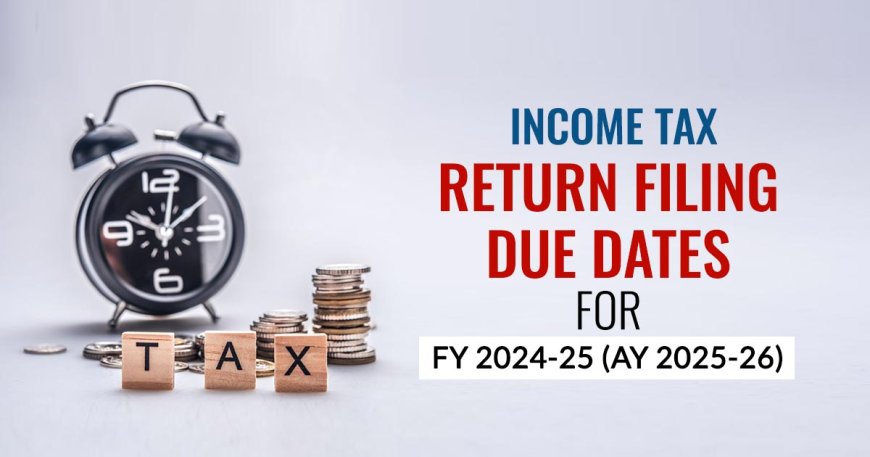Income Tax Return Filing Last Date: Everything You Need to Know

Filing your Income Tax Return (ITR) is not just a legal obligation, but also a crucial financial responsibility. Whether you're a salaried employee, a freelancer, or a business owner, understanding the timeline and deadlines related to ITR filing is essential. Missing the last date can lead to penalties, interest charges, and unnecessary complications.
In this article, we will guide you through the ITR filing due dates for different categories of taxpayers for the Assessment Year (AY) 2024–25, the consequences of missing the deadline, and tips to file your return accurately and on time.
Importance of Filing ITR Before the Due Date
Filing ITR before the deadline is important for several reasons:
-
Avoid penalties: Late filing attracts fines under Section 234F of the Income Tax Act.
-
Claim refunds: If TDS (Tax Deducted at Source) has been deducted, timely filing allows quicker refunds.
-
Loan and visa processing: Many financial institutions and consulates require ITR receipts.
-
Carry forward losses: Only timely filing allows carry forward of certain losses like capital or business losses.
Due Dates for Income Tax Return Filing (AY 2024–25)
The due dates for ITR filing differ based on the type of taxpayer. Here's a table that outlines the last dates:
ITR Filing Due Dates for AY 2024–25
| Taxpayer Category | Due Date | Audit Required |
|---|---|---|
| Individual / HUF (Non-audit cases) | July 31, 2025 | No |
| Businesses requiring audit | October 31, 2025 | Yes |
| Companies | October 31, 2025 | Yes |
| Taxpayers requiring TP report (Form 3CEB) | November 30, 2025 | Yes (TP Audit) |
Consequences of Missing the ITR Deadline
Missing the last date for ITR filing can lead to multiple financial and legal setbacks. Below is a list of possible consequences:
Consequences of Late ITR Filing
-
Late Filing Fee: Under Section 234F, a late fee of up to ₹5,000 can be levied.
-
Interest on Tax Due: Interest at 1% per month under Section 234A is applicable on unpaid tax.
-
Loss of Refunds: Delay in filing may lead to a delay in receiving tax refunds.
-
Cannot Carry Forward Losses: Losses from capital gains or business cannot be carried forward if the return is not filed on time.
-
Prosecution: In extreme cases, prosecution proceedings may be initiated under the Income Tax Act.
Tips to File Your ITR on Time
Here are a few expert tips to ensure you meet the ITR filing deadline without hassle:
Smart Filing Tips
-
Organize documents early: Collect Form 16, bank statements, TDS certificates, and investment proofs.
-
Use correct ITR form: Choose the appropriate form based on your income type.
-
Verify Form 26AS and AIS: Ensure TDS credits are properly reflected.
-
Check for pre-filled data: The income tax portal provides pre-filled data—verify it carefully.
-
Avoid last-minute rush: High portal traffic near the deadline may cause errors or delays.
-
Seek professional help: If your finances are complex, consult a CA or tax advisor.
E-Filing Portal and Steps to File ITR
The Government of India encourages all taxpayers to file their returns through the Income Tax e-filing portal. Follow these steps:
-
Log in to the income tax portal using your PAN and password.
-
Choose the correct assessment year (2024–25).
-
Select the appropriate ITR form.
-
Fill in or verify pre-filled details.
-
Compute tax and verify deductions.
-
Submit the return and e-verify it using Aadhaar OTP, net banking, or other options.
Final Thoughts
The Income Tax Return filing last date for AY 2024–25 is a critical deadline for all taxpayers. By staying informed and proactive, you can avoid penalties, maximize benefits, and ensure smooth financial planning. Mark your calendar, prepare your documents, and make sure to file your return well before the deadline.






























